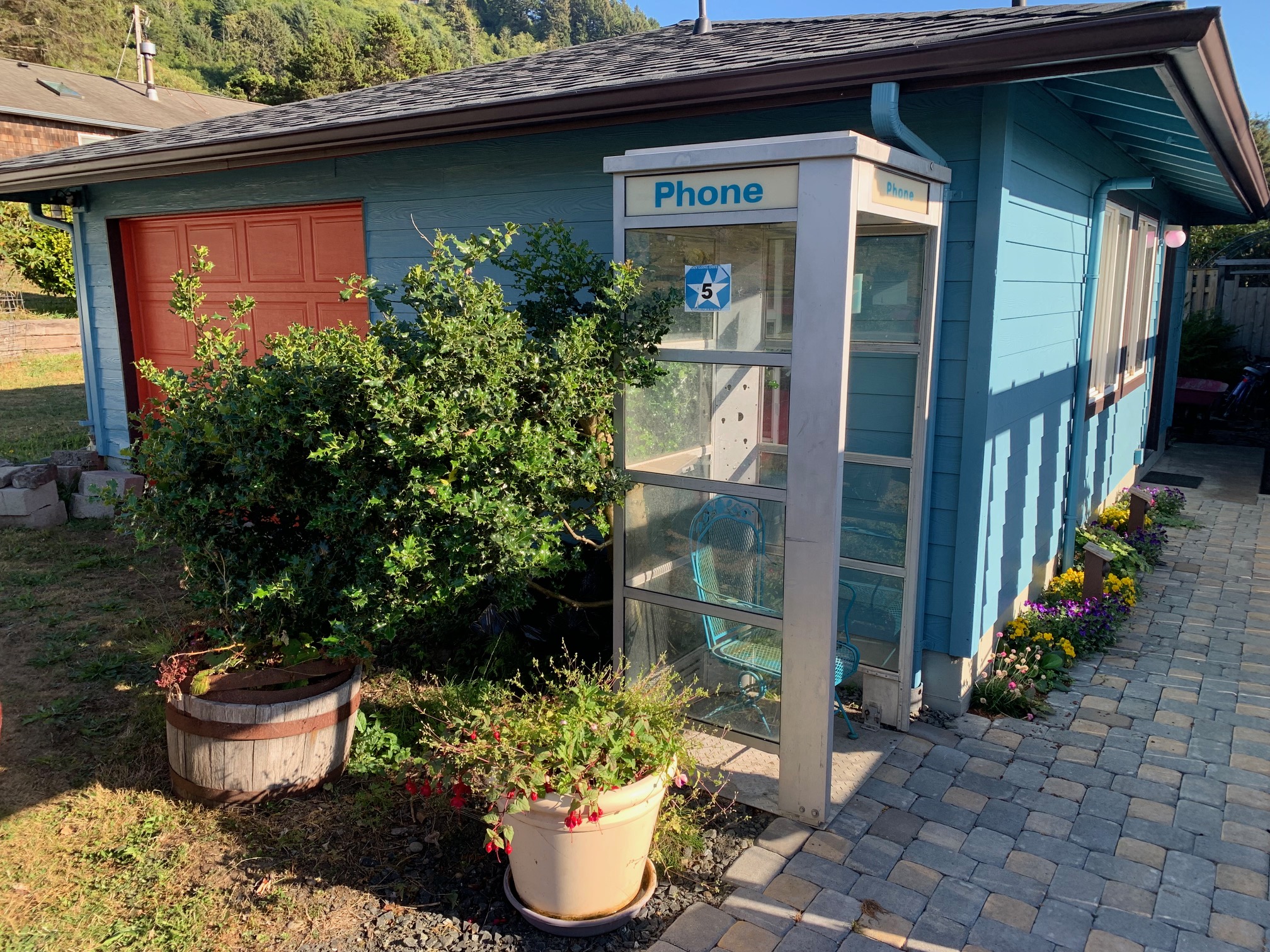
By GARRET JAROS/Lincoln Chronicle
YACHATS – An unexpected knock at the door is met with a “just a minute” as retired priest and former Yachats mayor Gerald Stanley makes his way to the front door of his studio apartment inside a converted garage.
The late afternoon sun reflects off his glasses as he opens the door which has his name and address affixed on a placard. A live recording of powwow drums and singing from a radio program plays on his stereo.
Despite no advance notice of a visit, the 87-year-old is more than willing to talk about the city of Yachats’ efforts to update its codes to allow for more unique and affordable housing options.
“I’m all for it,” Stanley said. “We need it. I think that we need and have an opportunity to get more people living here. And people need places to live that they can afford. I do talk with city council people and others who say it could bring our population up to 1,300 – and that would be fine.”
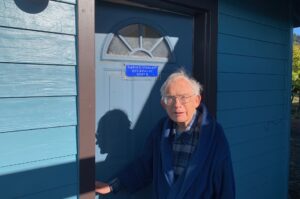
Stanley, who said he was “affectionately referred to as Father Mayor” because of his collared calling, served as mayor in 2017 and 2018 before stepping down because of a serious illness. He has lived in Yachats for 21 years and in the converted garage – what is officially referred to as an accessory dwelling unit – for the past two years.
“It is very affordable,” Stanley said. “I named what I could pay and they (landlords) took less. They are very wonderful.”
Stanley’s arrangement – and many similar ones around Yachats — is something the city’s current codes do not allow. It also is not something worth tracking down and enforcing, city officials say, especially because they hope to soon change the rules.
That is because Yachats is entering the final stretch of updating codes to reflect the city’s goals around affordable housing while also aligning with state requirements for larger cities with populations of 10,000 or more that planners say also make sense for smaller municipalities.
To update its housing codes, the city first commissioned Portland-based consultant Cascadia Partners in 2022 to analyze housing needs, then in 2023 to come up with an implementation plan, and finally a project to update codes that city officials say will be finished in April.
Cascadia’s work, paid for with grants from Oregon’s Land Conservation and Development Commission, was helped by collaboration with the Yachats planning commission, community meetings, online and written surveys, a council member, motel owner Drew Roslund, affordable housing developer Layne Morrill, and Yachats Community Presbyterian Church pastor Bob Barrett. Cascadia presented a draft of the final and third phase of its analysis along with recommendations during a city council work session last month.
Two more community sessions are scheduled – the first on Sept. 30 at the Commons – before code updates are expected to be finished in April.
“Cascadia’s presentation really highlighted how to get our existing code up to regulations with the state codes and how they’ve changed,” said Yachats city manager Bobbi Price. “They did an audit of our existing code to make sure we have everything in compliance with the state codes.”
They also had suggestions to help the city add to its housing stock by allowing more ADUs, which is a “big thing,” Price said. Following that is maximizing lot sizes – “allowing for side yard setbacks to be lessened to get more cottage clusters or multifamily housing possibilities on a lot.”
The ADU portion of the code concepts would allow for adding both internal units — dividing an existing single-family home into a duplex, for example, or adding a tiny house to a lot or converting a garage like Stanley’s into an apartment.
“And this is really valuable for that ‘aging in place,’ letting people stay in their homes longer, supplementing incomes as they are going through their retirement while also adding to our workforce housing,” Price said. “Another really cool aspect of these code concepts is it will allow us to use our existing housing stock without having to really change the feel or look of our neighborhoods.”
Stanley’s detached garage unit was built in the 1990s. When new owners purchased the property there was a different tenant in the unit. When he died, owner Stephanie Hanchett said she and her husband planned not rent it right away. But that changed after a flood of inquiries and meeting Stanley.
“I think it’s absolutely needed,” Hanchett said of the city’s efforts. “So we are pretty excited they are doing this. We bought this place a few years ago and there seems to be such a need. So we figure for the locals it would be a good thing. And I think there’s a need for seniors.”
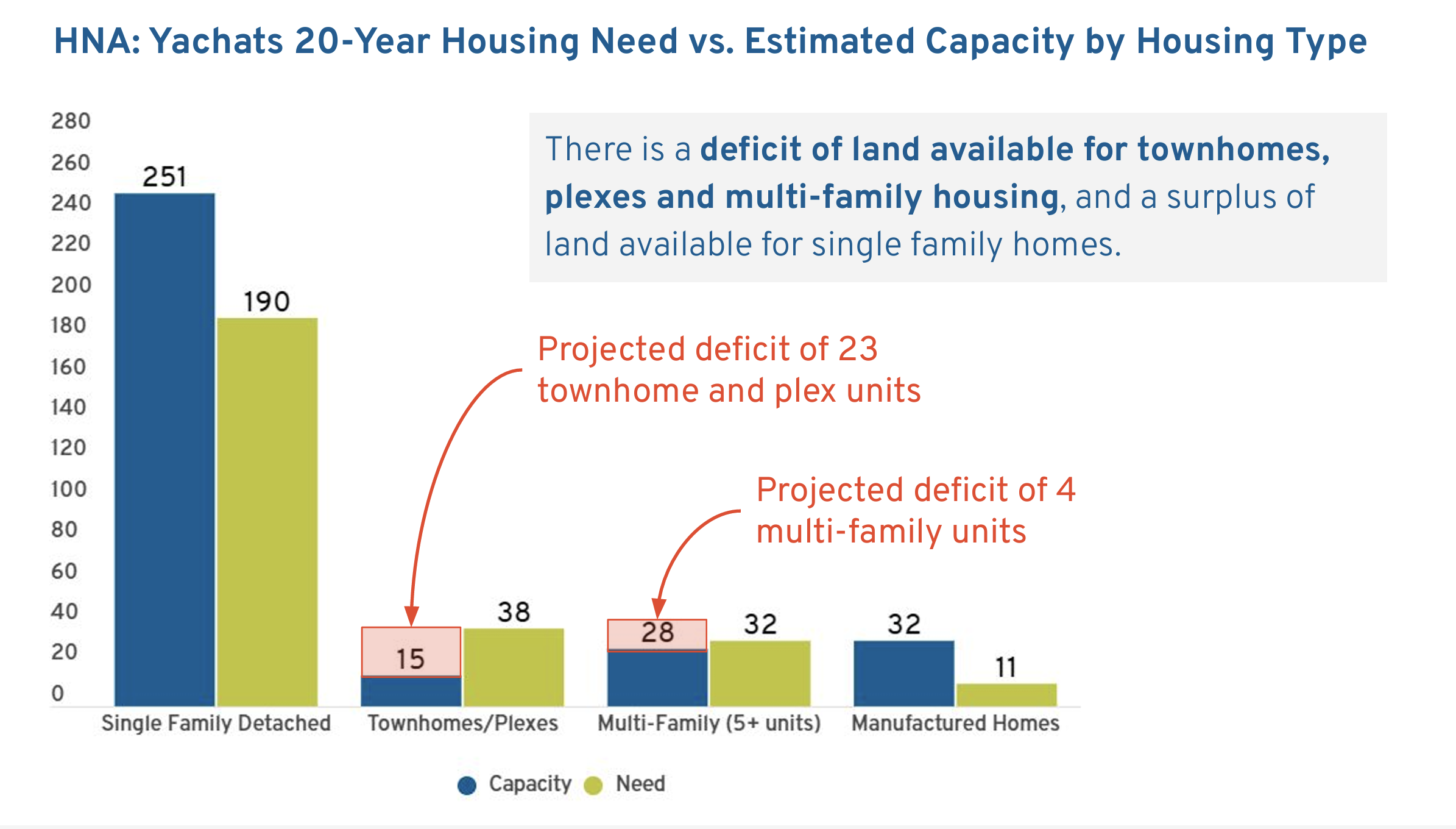
Analysis background
In Cascadia’s first report assessing housing in Yachats, the consultants said that, among other things:
- 81 percent of the housing consists of single-family homes, which means the city lacks housing options, particularly smaller units and long-term rentals;
- 58 percent of Yachats’ housing consists of second homes or vacation rentals;
- There is enough buildable land zoned for housing overall, but that does not mean land is available or practical to develop;
- There is a deficit of land available or zoned for duplexes, townhouses or multifamily housing; and
- There are there are few options on the market for first-time homebuyers and local workers, meaning housing will remain out of reach for many people unless other types of housing are increased.
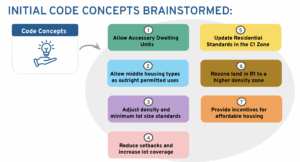
The final draft presented by Cascadia at the council’s workshop in July begins by summarizing the project as an effort to modernize the zoning and land use code, support more housing options, improve affordability, and reflect community values while also meeting legal requirements.
It begins with an audit of codes that comply, partially comply or don’t comply with state rules and statutes. The Yachats code partially complies with state requirements for manufactured home parks and subdivisions, the report states.
To achieve full compliance, updates are needed to:
- Allow manufactured home parks outright in R3 and R4 zones;
- Clarify approval standards to ensure they are clear and objective;
- Update standards applying to manufactured home park subdivisions; and
- Update definitions to allow prefabricated dwellings
These sections of Yachats’ zoning ordinances were found to not be in compliance with state statutes:
- Discretionary review procedures where administrative review is required;
- Occupancy limits that may discriminate based on family relationships;
- Overly restrictive standards for manufactured homes;
- Missing allowances for RVs used as housing and for disaster recovery; and
- No provisions for single-room occupancies, which must be allowed in residential zones.
The draft also outlined barriers to housing in Yachats: restrictive regulations in residential zones; residential density that is too low; minimum lot sizes that are too high; restrictive lot coverage and setback standards; restrictive regulations in commercial zones; and missing and ineffective incentives for affordable housing.
Some ways to meet housing goals through code changes, according to the analysis are to: allow ADUs and middle housing types as outright permitted uses; adjust density and minimum lot size standards; reduce setbacks and increase lot coverage; update residential standard in the neighborhood/commercial zone; rezone land now restricted to single family homes to a higher density; and provide incentives for affordable housing.
What’s next
Price said council members did not balk at the suggestions outlined by Cascadia during last month’s workshop.
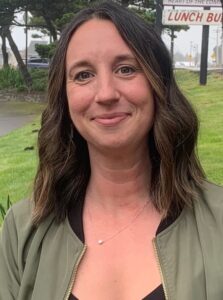
“There was a concern about how to address any new houses that are built for the purpose of affordable or middle-income houses not being second homes,” she said.
Price imagines some community members may have concerns about parking issues around single-family homes being divided or additional units added to properties, but that parking regulations are something that will be addressed in the codes.
“There will be more information for people when we have the community input sessions,” she said. “There will be educational components to make sure people are thinking about all of the different options of how this could unfold. An ADU isn’t just somebody putting a tiny house in their backyard that could block a portion of your view. Or a second house on the property.
“I think it is a really great project for the city to evolve through our housing implementation, to address city code to help remove barriers for housing supply and again – to allow people to age in place and have additional income.”
- Garret Jaros covers the communities of Yachats, Waldport, south Lincoln County and natural resources issues for Lincoln Chronicle and can be reached at GJaros@YachatsNews.com




















This is a great approach to the lack of affordable housing on the central coast. Yachats, once again, is setting the pace this time for ensuring available and affordable housing. This is greatly needed in our towns. Affordable housing brings families and workers, adds to our schools, and brings the diversity we need.
May I present a one example for all those considering high density “affordable” housing for Yachats:
Recent construction of a four condominium (each with an attached ADU) unit complex at the corner of Highway 101 and East Ninth street (across from Dollar General) is quite prominent now in Yachats. At a city council meeting I attended last year, one of the builder/owners referred to the structure as being ugly, which I believe to be an understatement. Each unit has a garage capable of holding one just one vehicle, so four vehicles can be garaged for 8 separate households. As the lot is quite small, the remainder of the property will be parking for the vehicles not garaged. Even though the complex is not fully rented now, the property is beginning to look like a used car lot. Is this the right kind of development for the “Gem Of The Oregon Coast”?
As for affordability, one of the units (not an ADU) is currently listed on Zillow for $2800/month with the renter responsible for all utilities. With total expenses somewhere around $3500/month, that is hardly affordable housing for people who would be working the type of employment in Yachats.
An addendum to my post above:
The city leaders who approved the condo complex I cited above are the very same ones promoting the need for much more high density housing in Yachats in the future. If you haven’t seen this complex in person I suggest you drive by and take a look at it. That is our current city leaders vision of what our unique little seaside village should look like in the future.
Just wondering as I see this in other areas including Newport….just because you update codes to allow for more “affordable housing” options, isn’t it still the property owner’s/developer’s right to charge whatever they want in rent or purchase price, such as the wide open and not affordable “market rate”? It seems the only new housing I see going up along the central coast that is truly low income/affordable are county/city/state backed projects which are far and few between. Other new housing options, including apartments/condos, seem to be the same old same old, typical expensive coastal properties geared towards deeper pockets. Seems some will take advantage of new codes to expand the potential for raking in some cash. Please correct me if I’m wrong about the new codes and if there is anything in place to insure affordable housing is built and not more vacation rentals or ” market rate” housing.
Why would we want to attract more people to Yachats?
Weird, Yachats has a water problem but it wants more water consumption and water consumers.
Solve the water problem and learn to live within our means first.
As temperatures rise, Lincoln County is expected to experience significantly lower streamflows in the summer and early fall. In fact, coastal watersheds are projected to see a 5–25% decrease in streamflow during these seasons. This was observed firsthand during the summer of 2025, when streamflows were at historic lows. Lincoln County has faced repeated drought emergencies in recent years, including declarations in 2018, 2021, and 2025. Climate change is projected to increase the frequency, duration, and severity of these droughts, which will further strain water resources for both communities and ecosystems. As water demand increases and availability decreases, public water systems will face significant challenges. Declining supply will exacerbate existing water issues for both domestic well users and public systems, potentially leading to conservation measures or increased water prices.
In my opinion, implementing the Cascadia Partners recommendations will hasten Yachats into water bankruptcy as the impacts of climate change affect Lincoln County weather patterns.
Goal K of the Comprehensive Land Use Plan requires that the City create and maintain a Public Participation Plan that provides for public influence in all phases of land use planning. And even though the Comprehensive Plan claims that Yachats “shall continue to use the adopted public involvement plan”, it is a completely false statement, and is only included to satisfy state regulators. Yachats does not actually maintain or use such a plan, and it is not available on the City’s website nor will staff provide a copy if requested. In fact, in 2019, the last time Comprehensive Land Use Plan was amended, city staff amended it with no public input at all. In 2021, I ask the City Council to comply with Goal K and implement the required Public Participation Plan. The Council declined, stating that Yachats has enough citizen participation, completely ignoring that Goal K is a State requirement. According to this article, to update its housing codes, ostensibly to comply with State requirements, the city first commissioned Portland-based consultant Cascadia Partners to analyze housing needs, then in 2023 to come up with an implementation plan, and finally a project to update codes that city officials say will be finished in April. The only citizen participation, is a reference to online and written surveys – the results of which are not presented (when they don’t present surveys results it’s because the results don’t support the agenda). If the City really wants to comply with State land use requirements, comply with Goal K first.
I agree with Michael’s assessment of this apartment complex. This project was built on 2 lots zoned R3,
however a 4th unit is permitted under the current code. What is not permitted are ADU’s or Studio Apt. The developer had been informed several times that under the current code these are not permitted. Each unit is about 400 sq ft and were listed at $ 1300.00/mo. Currently 2 of the units are occupied in violation of the current code. Seems to me this project is too excessive for the location.
Yes David I was informed last year that the ADUs for that complex had not been approved. I sent the city planner who approved the complex an email earlier this year inquiring if the ADU’s had been approved and received no response. It is probably a case of the developers putting in the ADUs and renting them after being assured the code would be changing.
Really glad to see this starting to take shape!
PS. My recollection is that Mayor Stanley completed his term and didn’t step down before it concluded.